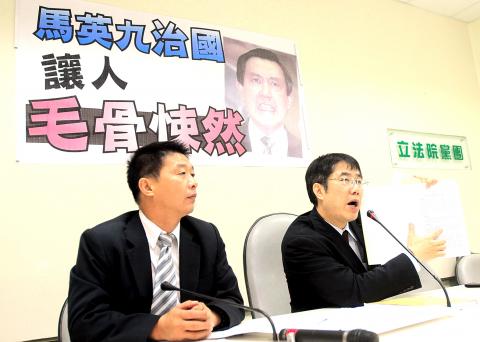|
Ma’s flood detention
pools comment sparks ruckus
WATERY FUROR: The KMT accused the ‘Apple Daily’
of distorting Ma’s comments, while DPP lawmakers lambasted the president for
claiming the flooding was a success
By Mo Yan-chih / Staff Reporter

DPP Legislator Huang Wei-che,
right, said yesterday what happened in Taipei during Typhoon Nari in 2001 has
been described as one of the worst examples of disaster preparation and relief
in history, but now Ma is describing it as an achievement.
Photo: Taipei Times
President Ma Ying-jeou (馬英九) yesterday
defended his comments on Taipei City Government’s handling of flooding during
the typhoon season, insisting that the flooding of MRT stations in Taipei during
Typhoon Nari in 2001 unexpectedly prevented the city from suffering more serious
damage.
“Many countries have built water conservancy infrastructure in non-traditional
locations, such as in parks or low-lying areas. Of course, we did not design the
MRT stations to be used for flood detention. It is just an example of flood
detention pools in urban areas effectively preventing flooding,” he said when
meeting reporters at the Presidential Office.
Ma’s comments came amid criticism of his previous remarks on the issue. While
presiding over a Chinese Nationalist Party (KMT) Central Standing Committee
meeting on Wednesday, he listened to the Ministry of the Interior’s report on
the government’s handling of flooding in the wake of Tropical Storm Trami.
As Taipei mayor at the time, Ma shared the responsibility for the Taipei City
Government’s handling of flooding when Nari hit Taiwan in 2001 and said while
major construction sites were flooded, the MRT stations prevented the city
suffering more serious flooding.
“Taipei Railway Station, MRT stations and construction sites were all flooded
during Typhoon Nari. It was a serious disaster for the city and it took months
to clean up. However, the flooding in Xinyi District (信義) was not as bad as we
thought because MRT stations accidentally played a role as flood detention
pools,” he said in the meeting.
Ma’s description of MRT stations as flood detention pools in the wake of Typhoon
Nari drew criticism, with the Chinese-language Apple Daily running a story with
the headline “Serious flooding in the wake of Typhoon Nari. Ma: Lucky to have
MRT stations as flood detention pools.”
Ma said he was not indifferent to serious flooding in the city and said the
government would devote more effort to flood prevention measures.
“Some people might interpret my comments in a negative way and think I was
indifferent by describing MRT stations as flood detention pools. That’s not what
I meant,” he said.
After cities in the south suffered serious flooding in the wake of Trami, the
Executive Yuan said it would examine flood prevention infrastructure around the
nation before determining whether to invest NT$60 billion (US$2 billion) to
build more facilities.
Ma said he supported the Executive Yuan’s plan and said that with weather
conditions getting more extreme around the world, the government would take
other nations’ experiences into consideration when building flood detention
facilities, while continuing soil conservation work.
The KMT yesterday also blamed the Apple Daily for distorting Ma’s comments and
said that Ma meant to instruct the related government agencies to enhance flood
prevention facilities in urban areas.
Unconvinced, Democratic Progressive Party (DPP) lawmakers lambasted Ma for his
remarks, which they said described city residents’ plight as a success of his
administration.
What happened in Taipei in 2001, which resulted in 26 deaths, serious flooding
in half of the downtown area and in adjacent New Taipei City, then known as
Taipei County, has been described as one of the worst examples of disaster
preparation and relief in history, DPP Legislator Huang Wei-che (黃偉哲) said.
“Ma at the time apologized to residents, but now he’s describing it as an
achievement. It’s unbelievable,” Huang said.
Additional reporting by Chris Wang
|
![]()
![]()
![]()